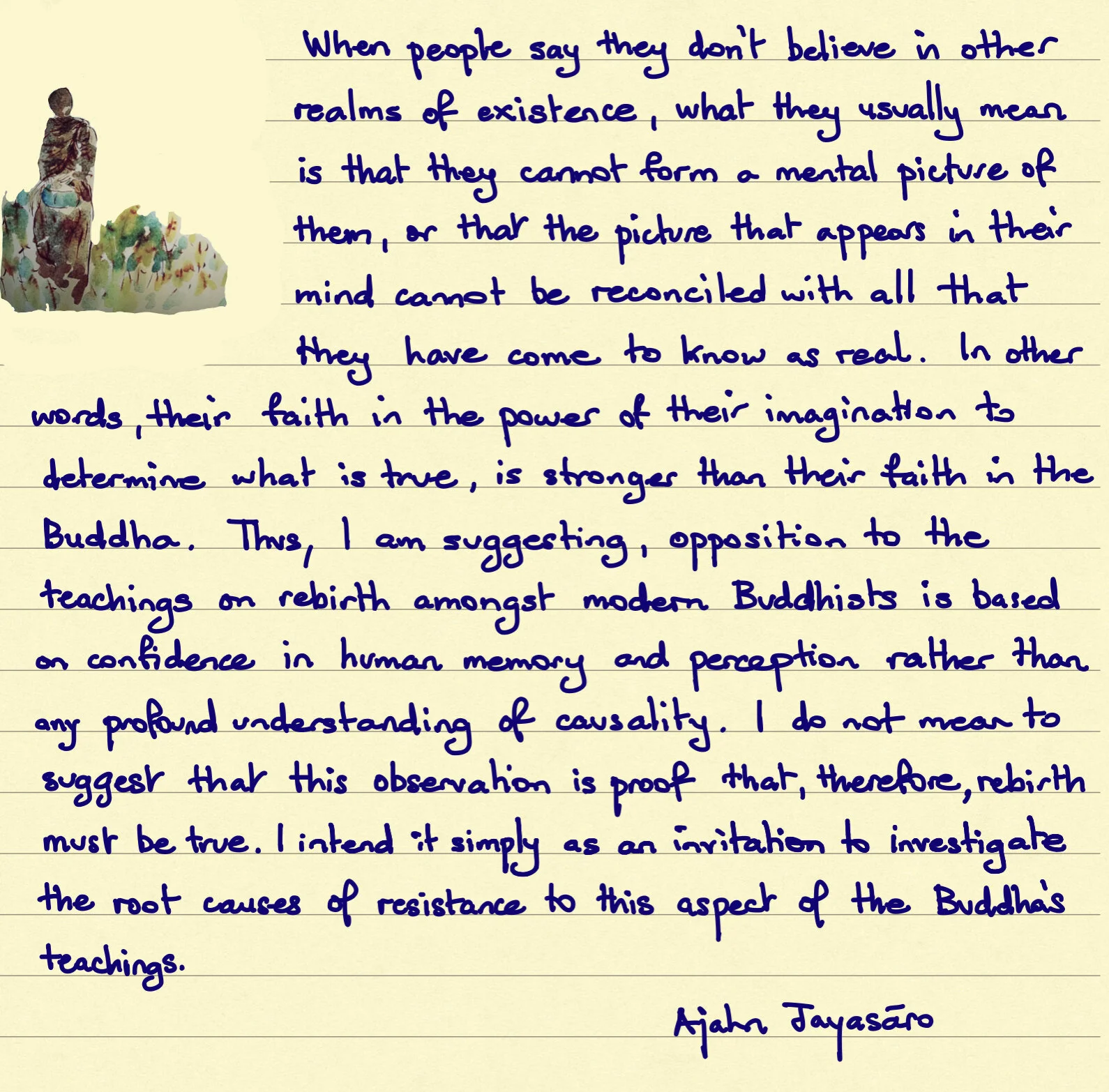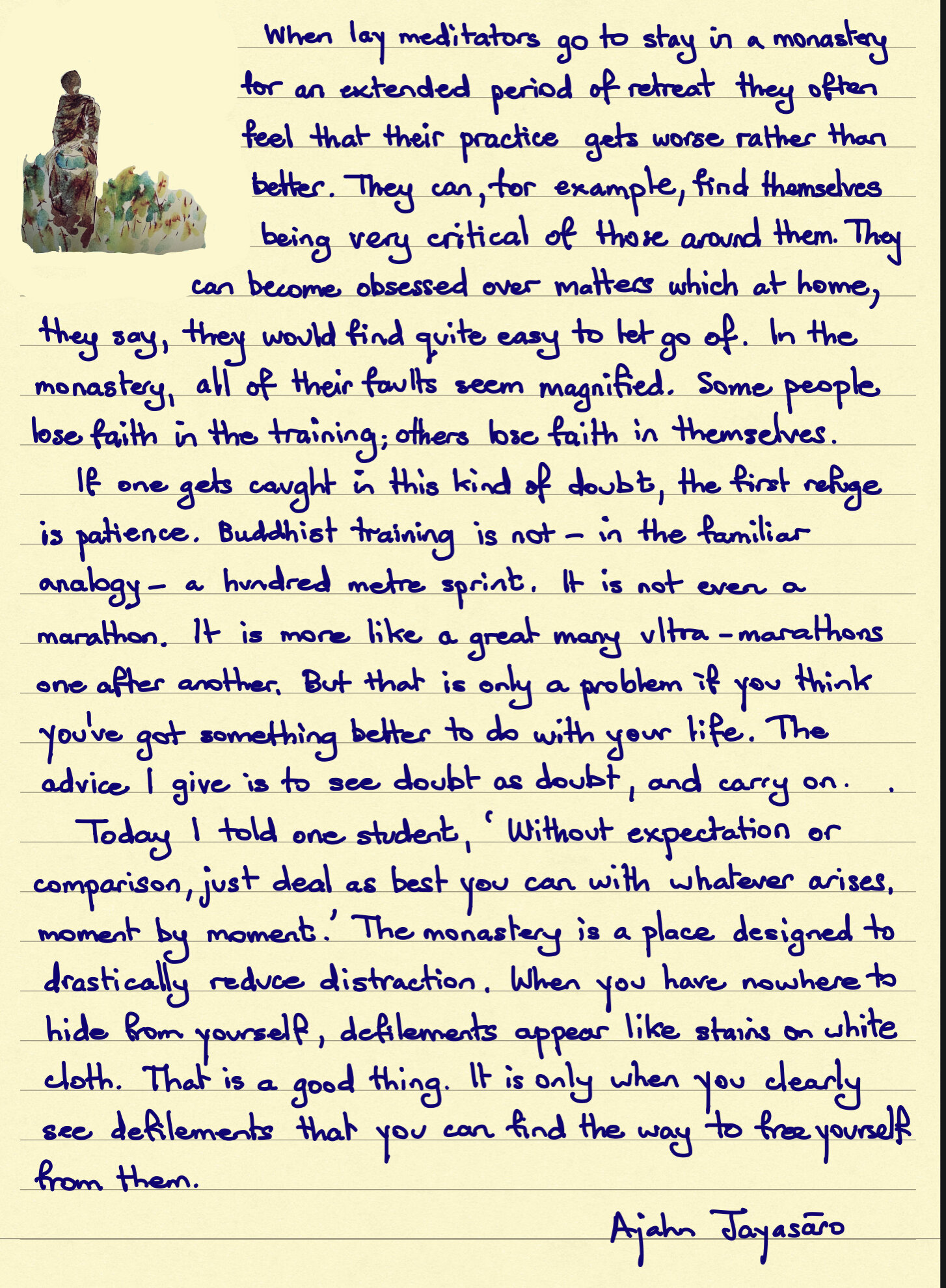

An Invitation to Investigate
When people say they don’t believe in other realms of existence, what they usually mean is that they cannot form a mental picture of them, or that the picture that appears in their mind cannot be reconciled with all that they have come to know as real.

True Happiness
So much human effort is mis-directed and reaps unnecessary frustration. Four kinds of effort stand out:
(i) Trying to get rid of or escape from present suffering, without understanding it.
(ii) Trying to find protection from the threat of future suffering, without understanding it.

Maintaining Mindfulness When Being Slandered
The Buddha did not try to convert members of other sects or religions to his teachings. Nevertheless, on a number of occasions during his life he was slandered and reviled by those who were jealous of him or who felt threatened by the truths he taught. On one such occasion, he reminded his disciples of two important reasons for maintaining their mindfulness when such attacks were made.

Dealing with the Pressure of Legitimate Expectations
One year, while I was leading the monastic community at Wat Pah Nanachat, a certain young monk would regularly miss the early morning chanting/meditation sessions and the afternoon work periods. When I spoke to him about it he told me that the source of his problems was the monastery bell

Conceit (māna)
Conceit (māna) is one of the most subtle of defilements – so much so that some of its forms tend to be considered as virtues. Etymologically, conceit is related to the idea of measurement. Conceit arises when we form an idea of self based upon measuring ourselves against others.

Clarity of Mind
Whatever form of meditation we practise, it is vitally important that we learn how to sustain clarity of mind throughout the session. Without that emphasis, the physical and mental relaxation that occurs as the meditation proceeds will result in dullness or sleepiness rather than samādhi.

The Owner of the Good Quality
One day recently a student of mine was praised for being kind. As a result, he immediately felt a warm feeling in his heart. Later, he wondered whether his reaction was a mental defilement.

Practising in the Monastery
When lay meditators go to stay in a monastery for an extended period of retreat they often feel that their practice gets worse than better. They can, for example, find themselves being very critical of those around them. They can become obsessed over matters which at home, they say, they would find quite easy to let of. In the monastery, all of their faults seem magnified. Some people lose faith in the training; others lose faith in themselves.

Tanhā
In the Four Noble Truths the Buddha identified craving (tanhā) as the cause of suffering. He revealed how it is only when craving has been abandoned that suffering will cease. It is important to understand that not all kinds of desire are considered to be forms of craving. Craving refers specifically to the desires that arise in the mind in the absence of authentic knowledge of the true nature of our life and the world we live in.

Separation from All That We Love
When someone important in our life passes away, our grief can be of many layers. If our relationship to that person was a central part of our life, then we may suffer from the realization that the person we were in that relationship – spouse, son, daughter, friend – has gone and will never return. We may thus, in a way, be grieving for a cherished part of ourself.

The Well-Trained Mind
How many times have we suffered, and how many times have we created suffering for others, because of our negative emotions? How many times have we been consumed by self-aversion because of things we have said or done? How many times have we acted in ways that we had previously promised ourselves, ‘Never again!’

Enmity
The Buddha once said, ‘Enmity never comes to cease through enmity. Enmity only ever comes to cease through non-enmity. This is a timeless truth.’
Over 2,500 years after these words were uttered we might add that it is indeed a timeless truth, but also one that is endlessly forgotten.

The Five Hindrances Arising during Meditation
One of the first discoveries in meditation is how unfree we are. The effort to sustain attention on a meditation object reveals just how little control we have over our mind.

Don’t Take the Feeling That You Are Being Rational as Proof That You Are
There is a well-known story of a man sitting by the side of a sack of chilli peppers. He bites on a chilli, grimaces and spits it out. He picks out another chilli and does the same thing. He repeats the same process again and again, even though it is unpleasant for him to do so. When asked what he’s doing, he replies that he’s searching for a sweet one.

How did Buddhism arrive in Thailand?
Two hundred years or so after the Buddha’s passing away, the great Buddhist emperor Asoka arranged for small groups of monastics to travel throughout the world…

Reflecting on Unfair Criticism
One helpful way of reflecting on unfair criticism is to recollect how normal it is, how many times even the purest of beings have been subjected to such treatment. The most famous example is perhaps the occasion when a woman called Ciñca Manavika accepted payment from religious teachers jealous of the Buddha to accuse him of making her pregnant.

What is the Buddhist attitude to women?
One helpful way of reflecting on unfair criticism is to recollect how normal it is, how many times even the purest of beings have been subjected to such treatment. The most famous example is perhaps the occasion when a woman called Ciñca Manavika accepted payment from religious teachers jealous of the Buddha to accuse him of making her pregnant.

A Special Pill
A person suffering from a number of ailments went to see a doctor. The doctor did not reveal his diagnosis but prescribed a certain pill for his patient which he said should be taken three times a day: morning, afternoon and nighttime.

Undermining the Attachment to ‘Me’ and ‘Mine’
All the various challenges that occur during meditation (and, indeed, life itself) involve us attaching to physical and mental phenomena as ‘me’ and ‘mine’. Thus any effective method applied to deal with those challenges must be aimed at undermining this attachment.

The Cultivation of Loving-Kindness
In this period of great stress and uncertainty, one of our most important tools to maintain sanity and balance is the cultivation of loving-kindness for self and others. On one occasion the Buddha listed the benefits that may be realised.
